The shipbuilding industry in Scotland and across the UK faces a significant challenge: a skills gap that threatens to slow work and frustrate schedules.
The demand for skilled workers often outpaces the supply, leaving vital positions unfilled and putting pressure on existing workforces.
This shortage is not just a local issue but a national concern, impacting the industry’s ability to compete globally and fulfil future defence needs.
The COVID-19 pandemic exacerbated these challenges, introducing unprecedented disruptions. Health and safety restrictions necessary to curb the spread of the virus led to reduced workforce on the shop floor and delays in project timelines. Apprenticeship and training programs, crucial for skill development and industry replenishment, faced interruptions, further widening the skills gap. The pandemic underscored the industry’s vulnerabilities, highlighting the need for resilient and innovative solutions to workforce development.
In response, BAE Systems has made an investment in the future of shipbuilding talent with the creation of the Applied Shipbuilding Academy. Part of a broader £100 million investment aimed at modernising facilities and embracing digital shipbuilding, the £12m academy represents a significant commitment to workforce development. Construction recently started on the new academy at BAE Systems’ Scotstoun shipyard on the banks of the River Clyde in Glasgow, just downriver from Govan.
The Academy will comprise a Modern Trade Hall and a Flexible Learning Hub. The Academy will support the development of the entire workforce, from apprentices to senior leaders, and forms part of the Company’s ongoing commitment to develop future talent. BAE Systems said that the facility will accelerate the modernisation of Glasgow’s historic shipbuilding industry, upskilling the existing workforce whilst attracting new talent to secure its future for generations to come. The facility will have areas dedicated to each shipbuilding trade, ship-realistic mock-up environments and research plus technology facilities. There will be more than 30 classrooms, a STEM innovation lab and office facilities.
When completed in the second half of 2024, the Shipbuilding Academy will provide bespoke training for almost 4,500 employees, including nearly 700 apprentices. The company was keen to stress that this facility will also help upskill and train their current workforce, allowing them to work more efficiently. These new facilities will also enable a substantial expansion of the successful early careers programmes at BAE Systems, doubling the intake in Glasgow to more than 200 new apprentices each year.
By addressing the skills gap head-on, BAE Systems has made clear that it aims to cultivate a new generation of shipbuilders equipped to handle the challenges of modern naval construction and ensure the industry’s growth and competitiveness, not just at its own sites.
BAE Systems is set to add 300 more apprentices and graduates to its workforce in Scotland in 2024 as the company continues to increase its shipbuilding capacity. This move is part of a broader strategy by BAE Systems to recruit almost 2,700 trainees across the UK, marking a notable increase in its commitment to developing young talent. The Govan and Scotstoun sites in Glasgow, tasked with building the advanced Type 26 frigates for the Royal Navy, will be major beneficiaries of this influx of new talent.
Charles Woodburn, Chief Executive BAE Systems, said previously:
“As the UK’s largest manufacturer, we have sites located right across the country and we’re investing hundreds of millions of pounds to equip young people with the skills they need to achieve their full potential. Providing high quality apprenticeships and graduate programmes gives young people a route into long-term employment and helps to grow the talent we need to deliver vital national defence and security programmes, including future fighter jets, nuclear-powered submarines and low earth orbit satellites.”
As many will be aware, I prefer to see the ships from my drone camera, but I’m sure many of you reading this would want to be part of the process. Just click here.


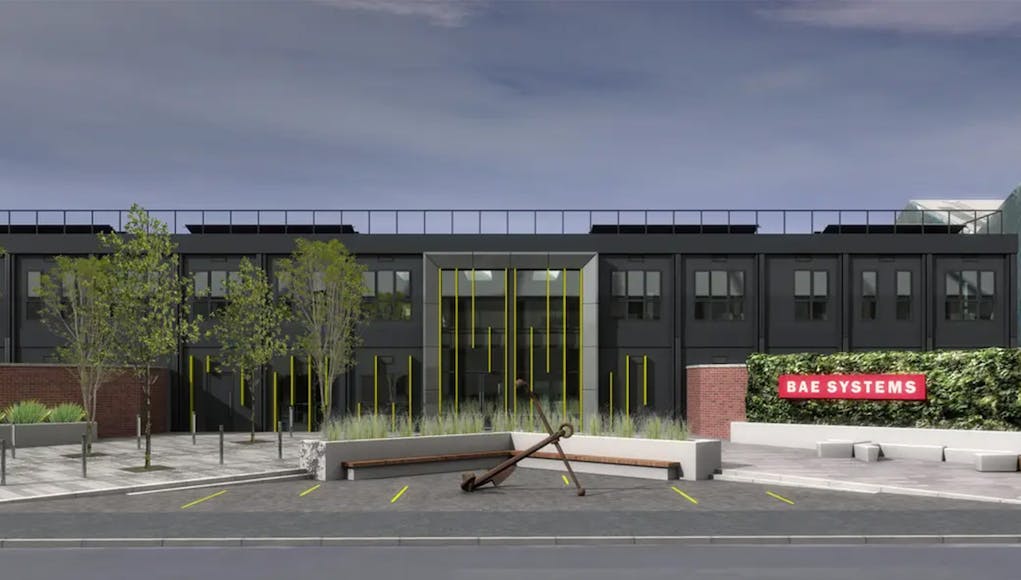
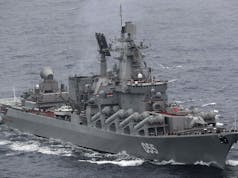
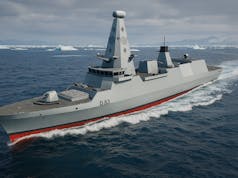

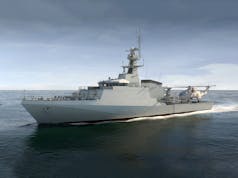

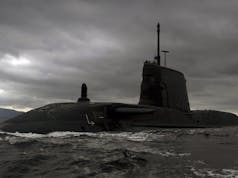
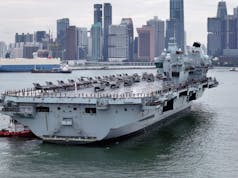
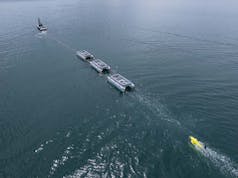
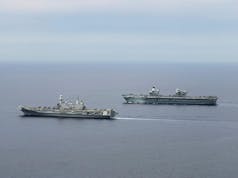


Brilliant. Well done BAE.
The industrial revolution began in 1760, where industry first learned of the need to train staff!
Of course there’d be less likelihood of a skills shortage if the orders kept coming at a steady and predictable pace. The whole notion of a ‘peace dividend’ irritates me- there is never really ‘peace’, just varying intensities of conflict that need to be managed dynamically.
Yes, with three yards building surface ships and one building SSN’s we should be able to achieve continuous build. Especially if we can use fabrication yards in England at AP Tyne and CL to chip in making blocks when production needs to be ramped up or down. We should get the idea of exports out of our mind as it only creates feast and famine.
Without exports there is not enough work to maintain 3 yards with surface ships. Currently Rosyth has no work after 2030.
Given the current geopolitical climate there really should be increased orders for the navy that would take care of that.
I’d imagine the Type 32s, whatever form they take, will cover the work post-2030
Or the type 83 destroyer
Or both, ideally.
8-10 Type 83s plus 5 Type 31s would be ideal.
A small balanced escort force would ideally consist of 12x T26, 12 xT31 and 9 xT83 (steadily replacing T45 after hull number 3).
All very well armed and equipped.
A fleet of that size is sufficient for our needs and importantly big enough to keep a steady drum beat of orders going, with ships being sold off and replaced at the 25 year point.
Just assuming UK requirements alone, with a fleet of 12 SSN’s and 4 SSBN’s, it would allow a steady drum beat of build, design and development.
How far away is the “replacing the T45’s?” They must still have their delivery mileage on the clock, they’ve been laid up for so long, surely their life must be extended well past the original service date?
I would think replacement starting at about 2040.
That would factor in well if we bought 9 T83’s, start building them in the mid 2030’s and ship 4 would replace HMS Daring.
I’ve got this all figured out, just give me the defence budget 😂😂
Thats a bit of negative view on exports, if you have base load of builds from the MoD then you have a feast already, export orders take it up a notch further, yes people will have to come in on contracts for term builds, but we’re talking years and years of work for an export of say 5 ships. There’s also going to be a lot of north sea decommisoning work and green energey work that could be slowed down if exports materialised, its choice to be a slave to some of the timelines on these things whilst turning down other work.
We could do more temporary work visa for overseas workers to fill any gaps, we have this idea that when someone comes to the UK, after so many years the must have the right to stay. Well here”s the thing I lived overseas for years and I knew once the work wasn’t their I had to move on. SO its not migrant workers who have this expectation they should stay forever, its us thinking they do, if you know from day 1 residency is dependant on work you setup your life accordingly.
Meanwhile we get to build more ships bringing export money into the UK which get taxed, GDP is up and therefore so is the defence budget is cash terms.
We need far more creative thinking in government tbh.
Ord without production rates don’t generate any profits. The skill shortage shouldn’t have happened in the first place.
Absolutely, the peace dividend was always horse shit.
What was needed was to remodel and requip our armed forces for the post cold war period.
What we got was pure and simple savage cutting of assets right across the board.
Good stuff, learning the latest way of doing things is going to be vital if we want to have a shipbuilding industry that works long term. I have respect for the veteran workers who’ve plied their trades for years, but we do need to be careful of the “we’ve always done it this way” mentality that doesn’t make best use of new process and equipment.
You need to be jolly careful, with in-house training, that you don’t create a monoculture……”this is the only way to solve this problem….”
This is a big problem in the NHS where NHS runs its own management training, All that achieves is a ‘rules is rules’ approach…….‘can’t do that because of XYZ….”
Fresh thinking is very valuable if you want spirals of improvement.
That is a very fair point- hopefully it will be managed well. In a best case scenario, there will be some natural cross-pollination with what Navantia is bringing to H&W over the water- avoiding that monoculture.
As H&W haven’t built a ship in decades I don’t think that’ll be a particular problem. OMT getting involved with Babcock was a good thing as they are experts in producitiy in shipyards.
There’s an expression I’ll always remember. I was with one of the engineers at work and one of the older shop floor guys who was challenging his new ideas said I’ve 25 years experience, to which the engieer said. Is that 1 years experience 25 times over or 25 years of different experiences.
I’ve not heard that before, but it is exactly the thinking that leads to the decline of industries that were once at the top of the pile- like we once were. We can’t afford for that to continue to permeate and ruin our chances to once again build out an industrial sector.
Skills are one thing using them is another, production should mirror the investment that the yards have already been given. The delivery rate is unacceptable, and wrongly accepted the investment is not reflected in the. Results it should be. Our ship designs are oversized for their type too iverteched leading up massive increasea in costs a billion pounds for a single submarine is is ridiculous spending mor for a a single Frigate is just reckless and disjointed the navy since the 1869’s gas been caught between what so we really want? The latest and the best technology, or the quantity of hulls. Weak governments sincethen have tried and failed to deliver both. The navy is a mess, not enough hulls, yet ships tied up vin a mothball state or up for sale.Type32, have take over the asylum the lunatics have taken over the asylum.sorry for the rant, I’m having a bad day nursey hasn’t brought me my meds yet🍻😭😭😭.
Apprenticeships. Training. It’s not rocket science. If businesses are expecting people to be born already trained they are in for a rude awakening…
Problem is apprenticeships have been undermined, for instance an apprenticeship as a shop assistant!!! However I beleive BAe are offering decent apprenticeships, hopefully similar to old indentured apprentiships back in the day.
Businesses pay taxes that go to more than a decade of leftist “education” while specifics are certainly to be done by the companies what they face is the terrible quality of that base education.
Football player Eric Dier,
“I was extremely lucky that I grew up at a club in Sporting Lisbon who were incredible at looking after us as human beings,” he said when in conversation with Neville on The Overlap. “From when we’re eight years old, the way they disciplined us, the way they taught us everything, the principles they installed in us to behave and be a good person, they were so strong. It came from a position of power because they’re Sporting Lisbon, and in Portugal every kid wants to play for them, so they could do that.(…)
“At Sporting, when I grew up, as I lived at the academy, you had to shake everyone’s hand and if you didn’t make your bed, you wouldn’t be allowed to leave the academy on the weekend. If you missed school, you didn’t play on the weekend, it didn’t matter who you were playing.
—–
“They are not given the right education in how to be a person when they are young. At Tottenham it used to infuriate me when young kids used to come train with the first team and couldn’t shake your hand properly and look you in the eyes.”
Amazing isn’t it. Pull the money out of defence for 20 odd years and suddenly industry hasn’t got any defence capacity. Surely industry should be sitting around waiting for orders. 😂
New apprentices , upskilling existing labour is fine , however that’s not the big issue . Given the improvements in fabrication equipment , technology and soon to be the belated new build hall there has not been any significant change in build methodology. It’s still build hulls, minimum outfit , launch , then years of final outfit , commissioning and then sea trials. Something has to be done to maximise work at the build phase before float out. Computer modelling makes it easy to break the ship into manageable units that should be fitted out much more than at present . It works in other areas of shipbuilding and in the oil any gas industry . Skilled engineers and planners should be sourced that can address this and put it into practice .Managing the workforce to suit would take reorganising to have the various outfitting trades working in sequence to complete their scopes instead of the usual working on top of each other and fighting for the same space . It can be done but whether the big chiefs would be interested is another matter .
The UK needs to spread this proportionately across the UK to the other traditional ship building areas. Scotland does appear to have a disproportionate amount of the work. I do hope the rest of the UK does not regret that.
This is not addressing a National skills shortage at all, unless BAE are inviting Babcock, A&P etc. It is addressing a company specific skills shortage. No investment in surface ships in England at all? BAE is placing all its bets on Scotland, nothing for the Tyne, Mersey, Portsmouth A&P etc. this sort of begs the question shouldn’t this be a government sponsored role working with industry? Driven by perceived future needs in all aspects by of naval requirements. UUV, USV etc
It would be nice to see similar investment in flexible adaptable small Drone manufacturing. An area we ignore too much in the uk